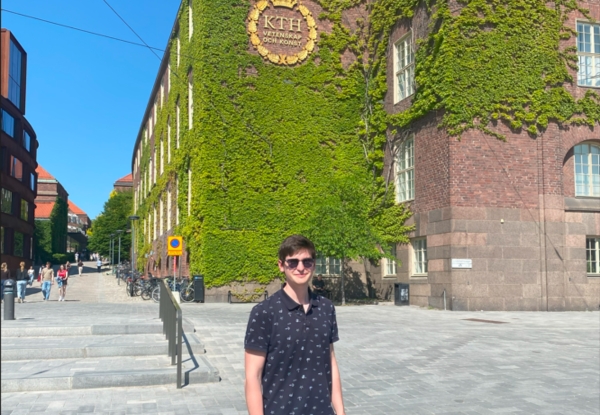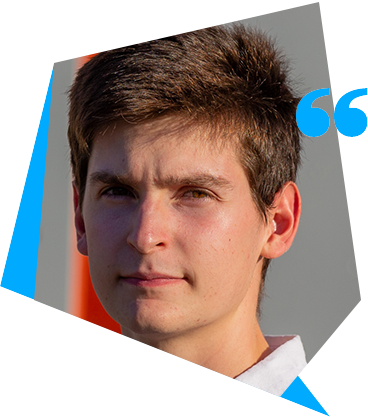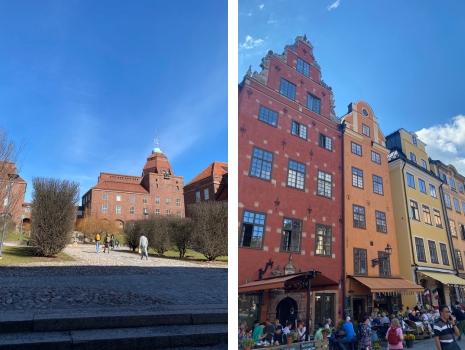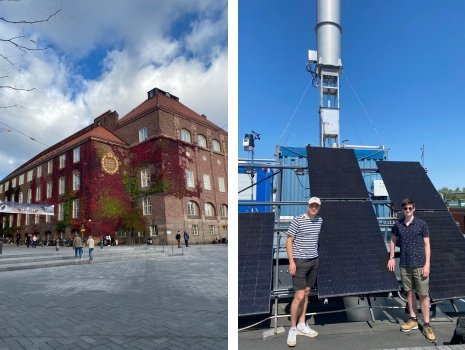< back to articles
Nicolas tells us about his 10 months at KTH
Published on
After spending almost a year in Sweden thanks to the Foundation’s support, Nicolas returned from his stay last June. Recognized worldwide for his commitment to the environment and sustainable development, he chose to complete his double degree at the Royal Institute of Technology to develop his skills in the field of renewable energies.
He tells you:

When I arrived at KTH, my motivations were diverse, both academically and personally. First and foremost, this double degree represented an opportunity to enhance my skills in the field of renewable energies. I knew that Sweden, and KTH in particular, was one of the best destinations in Europe for this purpose, recognized worldwide for its academic excellence and its commitment to the environment and sustainable development. I also wanted to improve my written and spoken English. Finally, I wanted to discover the culture of the Nordic countries and live, over a long period, in a foreign Scandinavian country.
To sum up, my stay went as smoothly as possible, thanks in part to the Foundation’s support.
How was your stay?
Nicolas Bonnefoy

Academically, I learned a lot about renewable energies. As Sweden is a world leader in this field, it was an incredible opportunity to learn directly from the experts and visit innovative or highly mature energy facilities. The courses I took were very diverse, which enabled me to gain both a comprehensive knowledge and a particular mastery of certain energy production or exploitation technologies. For example, I now have a thorough knowledge of energy storage thanks to the “Energy Storage Technologies” course, and a general knowledge of energy and transport thanks to the “Energy Technologies for Sustainable Transportation” course. I also discovered the teaching methods and pedagogy of Swedish faculties. In the program we followed, all classes were centered on interaction, with small class sizes enabling uninhibited communication, even going so far as to use the teachers’ first names in discussions. The teachers and assistants are also very attentive to the students’ needs, guiding us towards the best version of the projects we produce. Indeed, a strong emphasis is placed on practical projects and real-life case studies, which not only enable students to use the knowledge they have acquired in class, but also to delve deeper into certain subjects or learn problem-solving methods. For example, each module includes a project component, which accounts for more than half of the ECTS credits. Whereas in many technically intensive courses, laboratory sessions are organized to experiment and understand the application of theoretical concepts seen in class. I’ve also had the opportunity to train on different software used in companies such as SAM, HOMER Pro, EES or PolySun, and to improve my knowledge of numerical simulations and optimization methods in Python and Matlab.
What’s more, like the teachers at ISAE-SUPAERO, most of them are involved in research, which they are proud to be able to present to us in their introductory lecture. It gave me an insight into current research topics in the energy field and is giving me ideas for my master’s thesis. Academic highlights included lectures by industry professionals, such as Swedish BioFuels on SAF and NorthVolt on batteries, as well as site visits, such as the Zinkensdamms Idrottsplats open-air skating rink, which uses the principles learned in the “Energy Supply Systems for Buildings” course, and the KTH Living Lab buildings, which use solar panels and geothermal energy to meet the energy needs of campus students. I was also lucky enough to be able to choose my courses freely, which enabled me to take courses in nuclear energy and nuclear reactors, but also in connection with other universities that are members of the Erasmus program and the EIT InnoEnergy program, including an online course on maritime energy at the Technical University of Lisbon. A particularly interesting course was Artificial Intelligence for Renewable Energies, in which I was able to learn the main techniques of Machine Learning and Deep Learning and put them to good use in the project associated with this course, aimed at building and comparing different Deep Learning models for predicting the energy demand of KTH’s Building U, one of our course buildings. I hope I can inspire my fellow students and future students to take an interest in energy issues and take part in this academic exchange leading to a degree.
What do you take away from your stay in terms of culture?
On the cultural front, I discovered and participated in Swedish and Scandinavian cultural events. First of all, I discovered the Swedish way of life, where well-being and quality of life are very important. In addition, the Swedish way of life places a strong emphasis on work-life balance, which is highly respected, right from university.. For example, the Swedes attach a great deal of importance to time spent with family and friends and, as a result, course timetables are streamlined, special slots for personal or group work are dedicated and scheduled, and there’s a real respect for weekends and vacation periods, which I find creates an atmosphere conducive to quality work during the week. One tradition that runs through all spheres of Swedish society and that particularly struck me was that of the “fika”, an essential coffee break that’s much more than just a break. It’s a time for sharing and conviviality, with coffee and pastries, usually “kanelbullar” (cinnamon buns). This ritual is practiced daily and has enabled me to form bonds with my classmates and teachers. Occasionally, Fikas are organized during important course module events, such as project presentation seminars, which again helps to “play down” the situation and show off the best of our work. On a more general note, as soon as I arrived, I was struck by the city’s organization and cleanliness, as well as the efficiency of its public transport system. A single transport card, paid by the month, gives access to the huge intermodal network of buses, metros, regional trains and ferries. I was also struck by the respect and benevolence shown by the Swedes: discretion on public transport, cleanliness and collective sorting, no outbursts or apparent violence. In short, a standardized society, proud of their flag and their culture, whose strong values are education, civic-mindedness and respect for others and nature. Although Swedish is the official language, Swedes of all ages have a good command of English, which explains the “benevolence” felt, as it’s not uncommon for them to offer help or open up to discussion, with everyone and in all circumstances. Nonetheless, I continued to learn Swedish, which I started online before my departure, and which I’m continuing today because I enjoyed my stay and the country’s culture so much. Stockholm has a rich history and fascinating cultural heritage. I visited several museums and historical sites, including the Vasa Museum, home to a perfectly preserved 17ᵉ century ship, the Alfred Nobel Museum, the Stockholm City Museum in Södermalm, and the Skansen open-air museum on the island of Djurgården, the latter two of which trace the changing lifestyles of people in different Swedish regions over the centuries. During my stay, I was able to leave the capital and visit other towns and islands in the Swedish archipelago. For example, I was able to experience the extreme cold of Swedish Lapland (-30°C) by visiting Luleå and Abisko National Park. I was also able to discover the beauty of the wild landscapes, the colorful little houses and the tranquility of the archipelago’s islands (Utö, Gotland, Vaxholm, etc.). This immersion in nature enabled me to appreciate the importance of environmental conservation, a theme very much present in Swedish culture. All these visits and life events enabled me to discover Sweden’s cultural and historical roots, as well as its evolution into the modern, tolerant society it is today. Finally, my cultural integration was also achieved through the discovery of Swedish gastronomy: from meatballs and fried herring to elk steak and various pastries (princess cake, Semlor, kardemummabullar etc.), there was plenty to experiment with.


And on a personal level?
On a personal level, I was able to live and travel abroad for the first time for an extended period, which enabled me to gain in maturity and autonomy. KTH welcomes many international students, which creates a multicultural and dynamic environment conducive to interaction and exchange, and although reserved by nature, I have managed to make friends all over the world and considerably improve my command of the English language. Right from the start, I took part in integration activities organized by KTH’s student association, called THS, which enabled me to get to know students from all over the world, who will be doing the same Master’s degree as me, often in 2 years. Later, I took part in student gatherings via the Erasmus Student Network (like ESN Sea Battle) which also helped me meet students and make lasting friendships. I also keep in touch with the 12 international, European, Indian and American students who shared the common kitchen in the “corridor rooms” of my student accommodation with me, and whose shared meals and evenings were very important for morale during the long, harsh Swedish winter. My only regret was that I didn’t join a club or association, which, even though places are hard to come by for international students, would have enabled me to get to know more Swedish students. My stay in Sweden has enabled me to considerably improve my level of English, both in writing, with exams and project reports in English, and orally, with daily interactions with Swedes, my teachers, classmates and friends. I’m now more comfortable and fluent in communication on a variety of subjects, but above all I have a technical and professional vocabulary in engineering and renewable energies, which will be extremely useful for my future career.
Any highlights to share with us?
Other academic highlights of my stay included a sumptuous welcome ceremony at Stockholm City Hall, a tour of KTH’s energy industrial sites and laboratories, the defense of my group projects, including a poster on an energy polygeneration system for a village in Africa, and a presentation on ISAE-SUPAERO at a conference on academic mobility. Cultural highlights, such as flag days, St. Lucia’s Day, Nobel Prize week, and so on. And finally, personal highlights, such as trips to Sweden, Norway and Denmark, as well as events with international students. I now feel competent in the production, operation and storage of renewable energies, which will help me in my future academic and professional career.
What’s next for you?
Next year I’ll be taking the OTSU course with a specialization in Earth Observation to develop my knowledge of earth observation and climate. Next, I’d like to find my end-of-studies internship in a company or organization linking these two fields, particularly in earth observation for energy resource prediction and optimization. So, this stay has influenced my outlook by confirming my interest in energy, the environment and sustainable development, areas in which Sweden excels. I therefore plan to continue my studies in this field, in conjunction with aerospace, and to explore career opportunities that will enable me to contribute to global solutions for environmental challenges. I’m convinced that the network I’ve built up at KTH (participation in the THS Armada business forum), as well as the professional and interpersonal knowledge and skills I’ve acquired, will be invaluable assets in my future career.
In the short term, my final internship will involve writing a Master’s thesis, with a strong research component, which will be published on the KTH University website. This academic stay has given me a lot, from a personal, cultural, academic and professional point of view. It completely fulfilled all the expectations I had before my departure and on my arrival in Stockholm. All this would not have been possible without the help and support of the ISAE-SUPAERO Foundation, which enabled me to take full advantage of this experience abroad.
Any final words?
This stay was an important step in my academic and personal development. It has broadened my horizons, enriched my knowledge and prepared me for a future career in renewable energy. I am deeply grateful for this opportunity and I am convinced that the experiences and learnings of this semester will continue to positively influence my life and career.